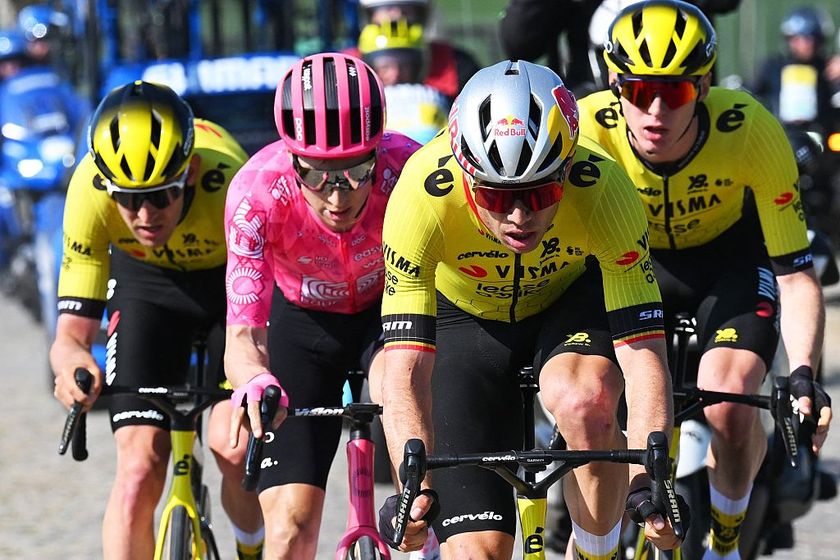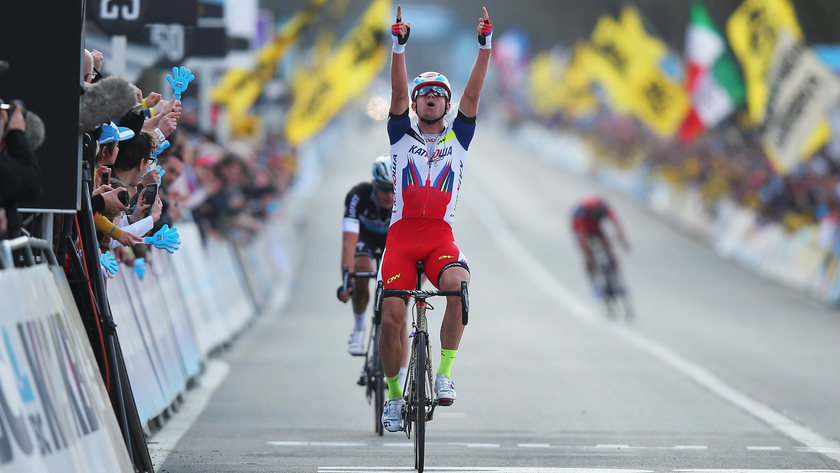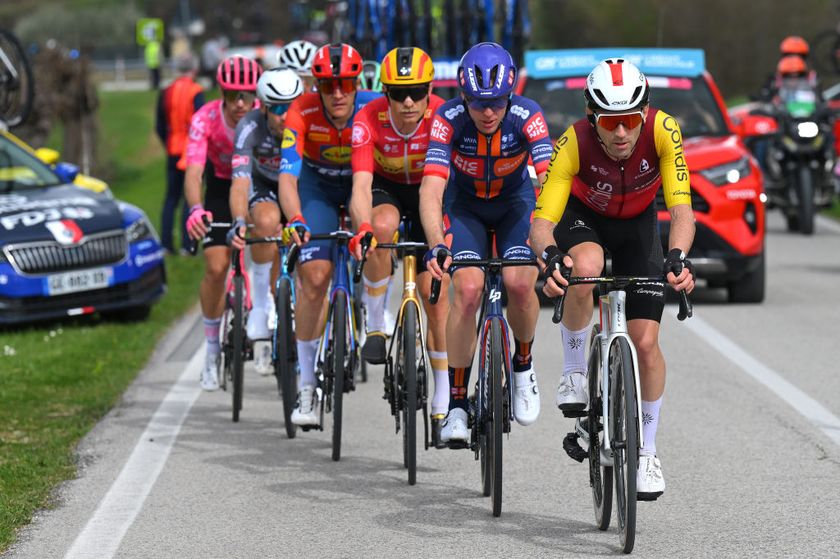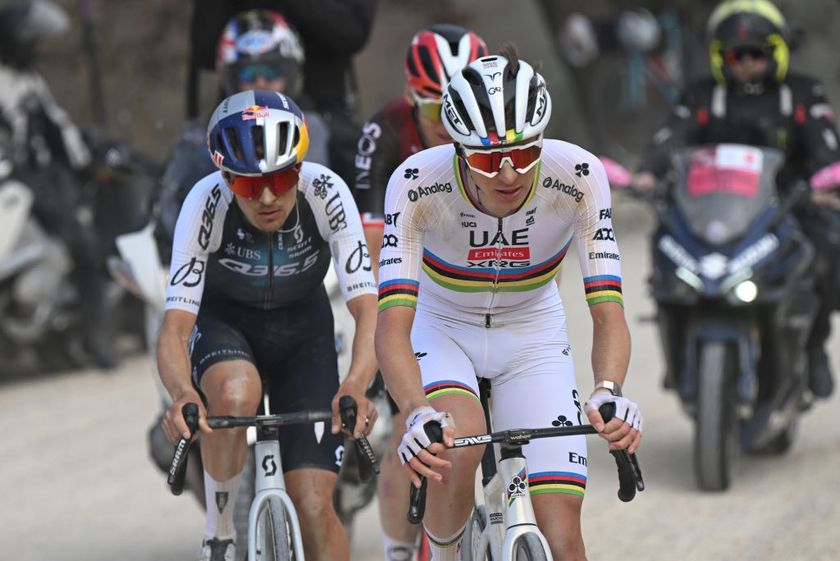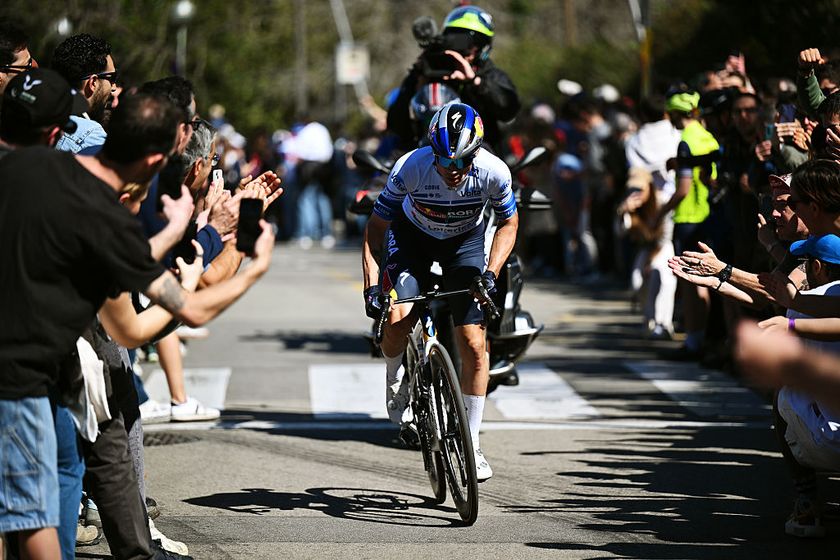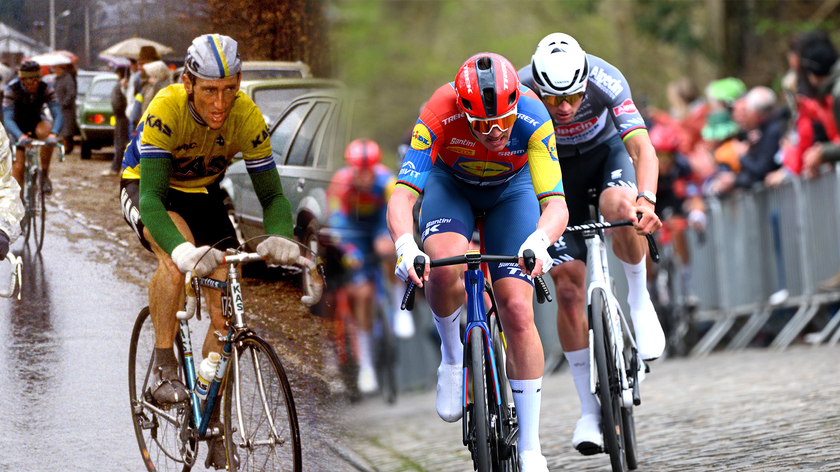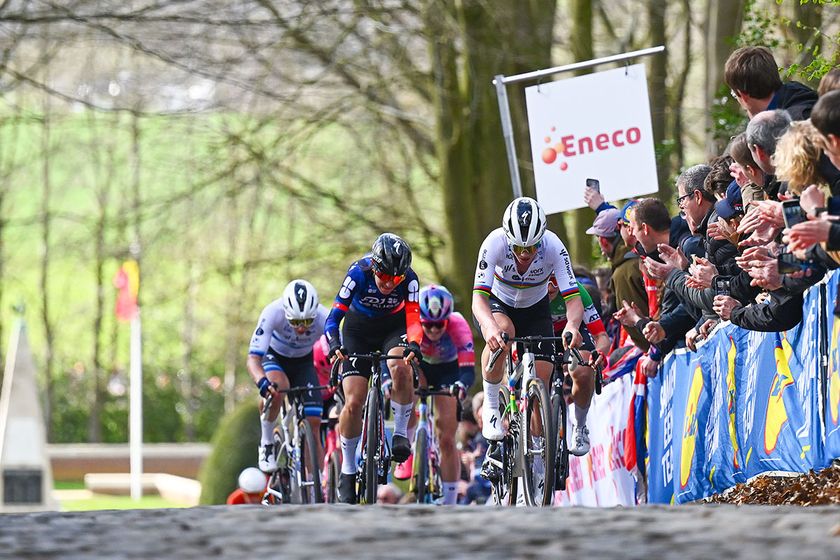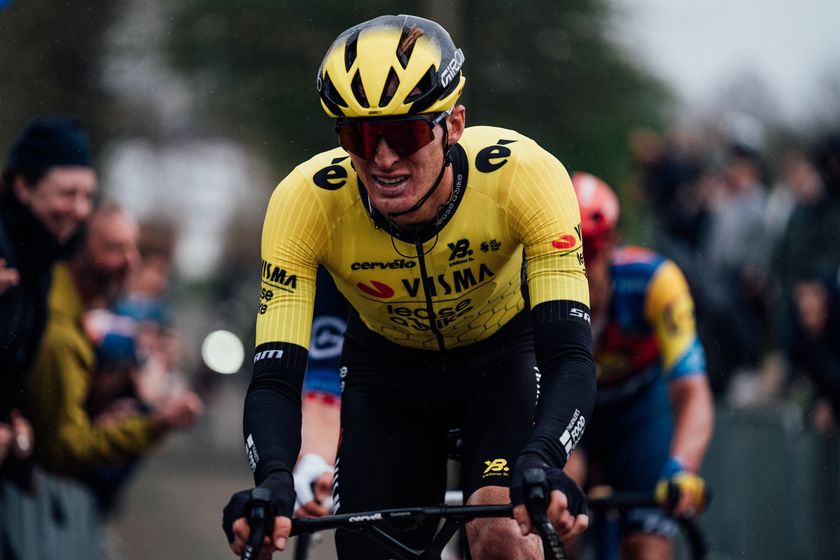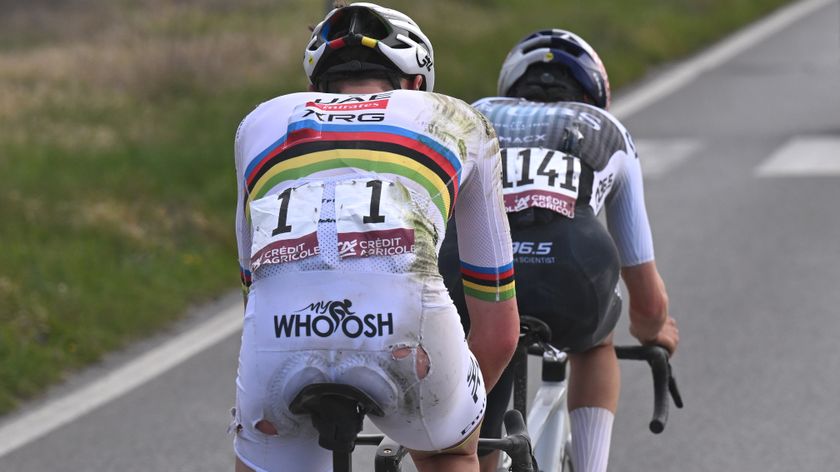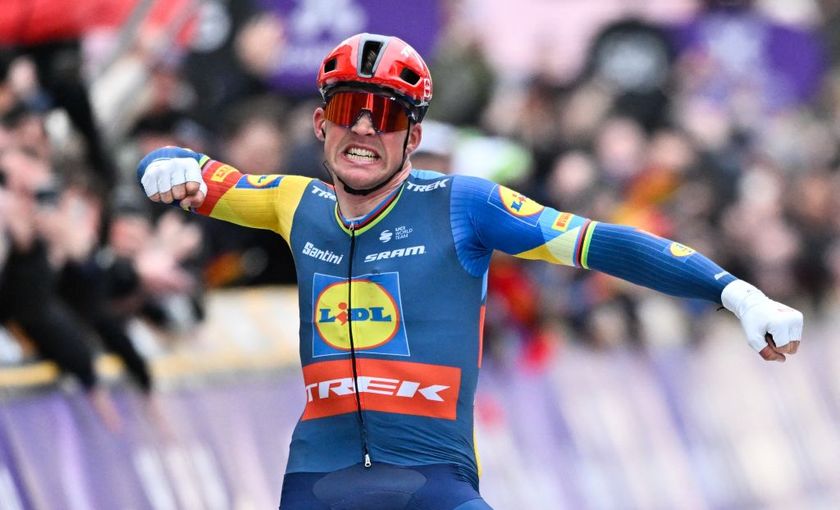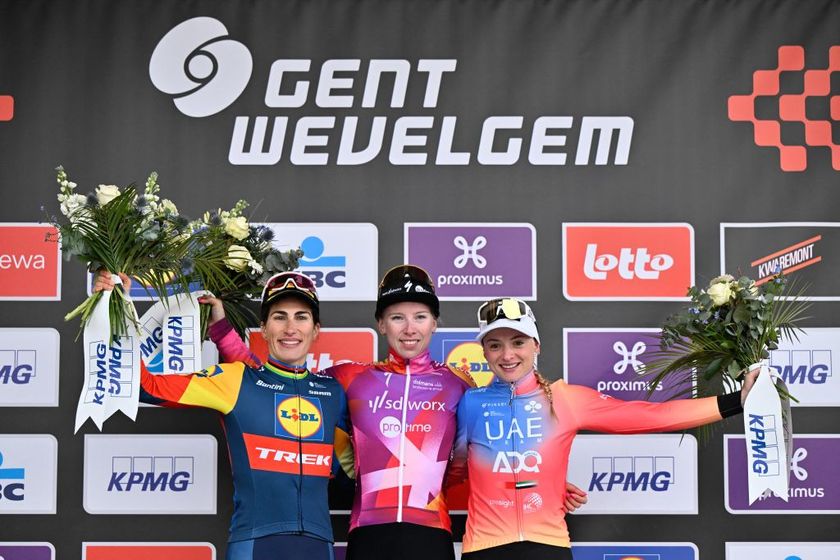Fitness questions and answers for July 26, 2007
Got a question about fitness, training, recovery from injury or a related subject? Drop us a line at...
Form & Fitness Q & A
Got a question about fitness, training, recovery from injury or a related subject? Drop us a line at fitness@cyclingnews.com. Please include as much information about yourself as possible, including your age, sex, and type of racing or riding. Due to the volume of questions we receive, we regret that we are unable to answer them all.
Carrie Cheadle, MA (www.carriecheadle.com) is a Sports Psychology consultant who has dedicated her career to helping athletes of all ages and abilities perform to their potential. Carrie specialises in working with cyclists, in disciplines ranging from track racing to mountain biking. She holds a bachelors degree in Psychology from Sonoma State University as well as a masters degree in Sport Psychology from John F. Kennedy University.
Dave Palese (www.davepalese.com) is a USA Cycling licensed coach and masters' class road racer with 16 years' race experience. He coaches racers and riders of all abilities from his home in southern Maine, USA, where he lives with his wife Sheryl, daughter Molly, and two cats, Miranda and Mu-Mu.
Kelby Bethards, MD received a Bachelor of Science in Electrical Engineering from Iowa State University (1994) before obtaining an M.D. from the University of Iowa College of Medicine in 2000. Has been a racing cyclist 'on and off' for 20 years, and when time allows, he races Cat 3 and 35+. He is a team physician for two local Ft Collins, CO, teams, and currently works Family Practice in multiple settings: rural, urgent care, inpatient and the like.
Fiona Lockhart (www.trainright.com) is a USA Cycling Expert Coach, and holds certifications from USA Weightlifting (Sports Performance Coach), the National Strength and Conditioning Association (Certified Strength and Conditioning Coach), and the National Academy for Sports Nutrition (Primary Sports Nutritionist). She is the Sports Science Editor for Carmichael Training Systems, and has been working in the strength and conditioning and endurance sports fields for over 10 years; she's also a competitive mountain biker.
Eddie Monnier (www.velo-fit.com) is a USA Cycling certified Elite Coach and a Category II racer. He holds undergraduate degrees in anthropology (with departmental honors) and philosophy from Emory University and an MBA from The Wharton School of Business.
Eddie is a proponent of training with power. He coaches cyclists (track, road and mountain bike) of all abilities and with wide ranging goals (with and without power meters). He uses internet tools to coach riders from any geography.
Get The Leadout Newsletter
The latest race content, interviews, features, reviews and expert buying guides, direct to your inbox!
David Fleckenstein, MPT (www.physiopt.com) is a physical therapist practicing in Boise, ID. His clients have included World and U.S. champions, Olympic athletes and numerous professional athletes. He received his B.S. in Biology/Genetics from Penn State and his Master's degree in Physical Therapy from Emory University. He specializes in manual medicine treatment and specific retraining of spine and joint stabilization musculature. He is a former Cat I road racer and Expert mountain biker.
Since 1986 Steve Hogg (www.cyclefitcentre.com) has owned and operated Pedal Pushers, a cycle shop specialising in rider positioning and custom bicycles. In that time he has positioned riders from all cycling disciplines and of all levels of ability with every concievable cycling problem.They include World and National champions at one end of the performance spectrum to amputees and people with disabilities at the other end.
Current riders that Steve has positioned include Davitamon-Lotto's Nick Gates, Discovery's Hayden Roulston, National Road Series champion, Jessica Ridder and National and State Time Trial champion, Peter Milostic.
Pamela Hinton has a bachelor's degree in Molecular Biology and a doctoral degree in Nutritional Sciences, both from the University of Wisconsin-Madison. She did postdoctoral training at Cornell University and is now an assistant professor of Nutritional Sciences at the University of Missouri-Columbia where she studies the effects of iron deficiency on adaptations to endurance training and the consequences of exercise-associated changes in menstrual function on bone health.
Pam was an All-American in track while at the UW. She started cycling competitively in 2003 and is the defending Missouri State Road Champion. Pam writes a nutrition column for Giana Roberge's Team Speed Queen Newsletter.
Dario Fredrick (www.wholeathlete.com) is an exercise physiologist and head coach for Whole Athlete™. He is a former category 1 & semi-pro MTB racer. Dario holds a masters degree in exercise science and a bachelors in sport psychology.
Scott Saifer (www.wenzelcoaching.com) has a Masters Degree in exercise physiology and sports psychology and has personally coached over 300 athletes of all levels in his 10 years of coaching with Wenzel Coaching.
Kendra Wenzel (www.wenzelcoaching.com) is a head coach with Wenzel Coaching with 17 years of racing and coaching experience and is coauthor of the book Bike Racing 101.
Steve Owens (www.coloradopremiertraining.com) is a USA Cycling certified coach, exercise physiologist and owner of Colorado Premier Training. Steve has worked with both the United States Olympic Committee and Guatemalan Olympic Committee as an Exercise Physiologist. He holds a B.S. in Exercise & Sports Science and currently works with multiple national champions, professionals and World Cup level cyclists.
Through his highly customized online training format, Steve and his handpicked team of coaches at Colorado Premier Training work with cyclists and multisport athletes around the world.
Brett Aitken (www.cycle2max.com) is a Sydney Olympic gold medalist. Born in Adelaide, Australia in 1971, Brett got into cycling through the cult sport of cycle speedway before crossing over into road and track racing. Since winning Olympic gold in the Madison with Scott McGrory, Brett has been working on his coaching business and his www.cycle2max.com website.
Richard Stern (www.cyclecoach.com) is Head Coach of Richard Stern Training, a Level 3 Coach with the Association of British Cycling Coaches, a Sports Scientist, and a writer. He has been professionally coaching cyclists and triathletes since 1998 at all levels from professional to recreational. He is a leading expert in coaching with power output and all power meters. Richard has been a competitive cyclist for 20 years
Andy Bloomer (www.cyclecoach.com) is an Associate Coach and sport scientist with Richard Stern Training. He is a member of the Association of British Cycling Coaches (ABCC) and a member of the British Association of Sport and Exercise Sciences (BASES). In his role as Exercise Physiologist at Staffordshire University Sports Performance Centre, he has conducted physiological testing and offered training and coaching advice to athletes from all sports for the past 4 years. Andy has been a competitive cyclist for many years.
Michael Smartt (www.cyclecoach.com) is an Associate Coach with Richard Stern Training. He holds a Masters degree in exercise physiology and is USA Cycling Expert Coach. Michael has been a competitive cyclist for over 10 years and has experience coaching road and off-road cyclists, triathletes and Paralympians.
Kim Morrow (www.elitefitcoach.com) has competed as a Professional Cyclist and Triathlete, is a certified USA Cycling Elite Coach, a 4-time U.S. Masters National Road Race Champion, and a Fitness Professional.
Her coaching group, eliteFITcoach, is based out of the Southeastern United States, although they coach athletes across North America. Kim also owns MyEnduranceCoach.com, a resource for cyclists, multisport athletes & endurance coaches around the globe, specializing in helping cycling and multisport athletes find a coach.
Torn knee ligaments
Weight training
Getting going
Ligament injury
Air temperature and heart rate
Blood transfusions
Dislocated shoulders
Saddle choice
Sartorious muscle spasm
Chocolate milk study
Sprint position
Torn knee ligaments
Today, I was reading your response to Marc in Texas about burning knee pain. Is it possible to ride with a torn knee ligament of any type?
Bare facts:
1) I ride 50 miles x four days per week;
2) Sidi shoes with Time pedals;
3) Left knee burns after rides;
4) Onset of pain was a long uphill ride with a very strong crosswind from right;
5) I have experienced months where the knee is perfectly normal and then, for some mysterious reason, begins to become painful again.
Greg Blanch
Dave Fleckenstein replies:
There's nothing really in his description or mechanism that would indicate a ligament tear - these individuals almost always indicate an acute mechanism of injury and a complaint of positional instability. Clinically this presents more as a patellofemoral irritation with an overuse syndrome.
Weight training
I want to combine my weight training program (from the book Weight Training For Cyclists by Eric Schmitz & Ken Doyle) and am unsure where I should be completing the hardest part of the weight training.
I intend to implement a 12 week high intensity on bike training program peaking at a major race. The toughest part of the weight program and the last period before the endurance workouts is the power phase (weeks 21-24) and I'm unsure where I should aim to complete this phase of the weight training - should it be before the start, half way through or the end of the high intensity on bike program?
Andrew
Richard Stern replies:
Given that weight training isn't crucial to some/most cycling performance (endurance cycling performance) and given that the acute effects of weight training on cycling are likely to increase fatigue, and that the chronic effects of weights will lead to decreased endurance performance, then I would suggest that if you still want to do weights that it is as far away from your peak events as possible.
Getting going
I started road riding in March this year. I ride about 75 miles a week at a moderate pace (17 to 18 mph). My problem is that for the first 15 to 20 minutes when I'm riding I feel completely exhausted. It seems to take me about 5 or 6 miles to start getting my legs. What can I do to correct this condition?
I'm a male age 40, 6'0 170lbs.
Any help would be greatly appreciated.
Ken Misch
Scott Saifer replies:
Great question! The feeling you are describing is what experienced cyclists know as the need for a warm up. The "cure" is simply to plan that the first 20 minutes of every ride should be at a very relaxed pace. Don't try to push until your legs, heart and lungs are ready for it.
Ligament injury
I'm a 22 yr old Australian road cyclist who suffered a torn ACL, MCL in the right knee in a motorcycle accident 6 days ago. I'm just starting to get the swelling down and getting over the disappointment of missing the second half of my first serious road cycling season.
Just wondering if you have any information about how this injury will affect successful competition in the future, particularly stability in the knee when climbing and during strength efforts (I have aspirations to reach a state/national level) and any information on time frames before I can ride after surgery and the suitability of cycling as a form of rehab.
Thanks for your advice, I am desperate to get back on the bike and need some hope!
Marissa
Kelby Bethards replies:
Sorry to hear about your accident, that sounds awful.
Air temperature and heart rate
When riding in summer heat, I find my heart rate is noticeably higher than during the cool months when I'm putting the same power into the bike.
Question: Have experiments been done to correlate changes in heart rate on the bike with changes in ambient air temperature? Is there at least a rule of thumb for factoring in the role of high heat during a race or training ride when keeping track of heart rate?
Jim Hargett
Scott Saifer replies:
Yes, some research has been done, but no one can give you the answer you are looking for. The problem is that as you do or don't maintain hydration, and as the humidity rises and falls, the heart rate will change even at the same power output and temperature.
Blood transfusions
I have but two questions:
1) If a rider is simply receiving blood transfusion (i.e. new blood), what is the benefit? Is it enriched with a higher content of red blood cells?
2) If the rider is getting a homologous transfusion (of his own blood), is this detectable?
Matt Vawter
Boulder, CO, USA
Scott Saifer replies:
When a rider receives a transfusion of whole blood, there are several benefits. For one, even if the new blood has the same red-cell concentration as the rider's original equipment, increased blood volume means increased venous return (more blood coming back to the heart) which means the rider can maintain a higher stroke volume at high heart rates.
Dislocated shoulders
A disaster for Michael Rogers but is it not possible to relocate shoulders so he could continue?
John Andrews
Perth, Australia
Kelby Bethards replies:
Yeah, that is a bummer for Michael. Sad.
Saddle choice
I noticed this article from Mr. Hogg about saddle choices. I would like to know if the Selle Italia Pro Link Trans Am seat is similar to the Selle Italia Flite model which I currently ride? And /or if the SLR Trans Am is similar to the Flite. I have the hanging issue and thought maybe it's the saddle
Howard
Steve Hogg replies:
The Pro Link, the Flite and the SLR Trans Am (discontinued but replaced with the similar SLR Gelflow) are all different shapes and depths. The 'hanging' issue you are referring to is, I assume, your tendency to favour one side. That has nothing to do with the seat, though seat shape can influence how severely it occurs. You sit asymmetrically because you function asymmetrically, not because of your choice of seat.
Sartorious muscle spasm
I greatly enjoy your fitness information and have used much of it with great results. I am 59 years old, commute to work approximately 300 miles. weekly, base training, and race weekends. Winter is skiing and weights. Stretch only after proper warm ups or workouts.
Currently my bike is set up with approx. 15 degrees of knee bend at bottom of pedal stroke, no hip rocking, reach and balance on seat are per your recommends. Cleat position is also per your test of further mid foot, feels great, also run Big Meat wedges resulting in no knee splaying.
My question is, on long races, 100miles plus, my Sartorious muscle will go into spasm cramps, both legs but not always at the same time. I can usually create some relief with on bike acupressure, but the spasms returns. This condition has reared its uncomfortable head before my bike was set up properly and after your recommendations.
I follow the Hammer product nutrition philosophy and electrolytes with no relief. The rest of my eating habits are per any trained athlete. Any suggestions would be greatly appreciated.
Stewart
Steve Hogg replies:
The Sartorious plays a part in rotation of the thigh and flexion of the hip. The only time that I have heard of this problem previously has been when the rider has been generally tight in hips and lower back AND was either:
Chocolate milk study
I was interested to read Scott Saifer's comments on recovery drinks, and thought I'd search for the article you cite "Chocolate milk as a post-exercise recovery aid, Karp et al, 2006" as I'd heard people speak of it before, although not knowing the exact study.
Disappointingly, I found that at the end it states "This study was supported, in part, by the Dairy and Nutrition Council, Inc.". Although the International Journal of Sport Nutrition and Exercise Metabolism might well be an independently peer-reviewed journal, this association casts doubt in my mind about the validity of the findings.
Howard Waller
Scott Saifer replies:
I share your concern. This is a very common possible problem. I don't see it as discrediting the study, but just meaning that we need to read the study itself rather than accepting the abstract or the conclusions.
Sprinting position
I am a 31 year old male, about 6ft 1 and about 190lbs. I mainly race 3rd grade local club and open criteriums and ride a new Argon18 Platinum. I have a good fit on the bike from where I bought it and never get sore etc after a long ride. I have a question relating to position on the bike when sprinting.
I have a reasonable sprint when in a good position in the pack near the end and can get the bike up to low 60k's in the finish. However I can only reach these sort of speeds and get any power/acceleration when holding the brake hoods. If I hold the drops I can't get any power at all and just go nowhere fast. This is where you see the pros sprint from and is supposed to give more power.
I have asked a few local guys, racers and coaches and so far nobody seems to have a reason for this. Any suggestions/tips to try or things to read up on would be greatly appreciated.
Adam
Brisbane, Australia
Steve Hogg replies:
The drops should allow you to jump harder if they are placed well for you. If you sprinting better on the brake hoods than the drops, the only thing that immediately occurs to me is that your bars may be too low or too close and that your drops should be more or less where your brake hoods are. Experiment a bit and let me know what happens.
